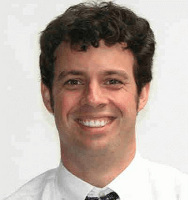 Brian Healy, PhD ’07
Brian Healy, PhD ’07
Assistant Professor, Department of Neurology
Harvard Medical School
Primary Biostatistician, Partners Multiple Sclerosis Center
Where do you currently work and what are your job responsibilities?
I currently work in the Department of Neurology at Harvard Medical School (HMS), and I am the primary biostatistician at the Partners Multiple Sclerosis (MS) Center. In this role, I design and analyze studies in a wide range of areas related to MS. In addition to my work with MS, I teach several introductory statistics courses to a variety of audiences at HMS and HSPH.
What do you like most about your current position?
The best part of my current position is the wide range of roles I get to play. Since I get to teach, work on collaborative projects, and write papers, each day is different and interesting. Teaching statistics has also become extremely valued in the medical community so there are many different opportunities to teach researchers about basic and advanced topics in statistics. Since I enjoy teaching, this makes my job very rewarding.
Why did you choose to study biostatistics and what led you to Harvard?
In college, I had never taken a statistics or economics course so my path to the department was different than most people. After I graduated, I was a middle school math teacher as part of Teach For America. During the summer, I worked in a pharmacogenomics lab in a pharmaceutical company. Although this was interesting work, all of the data analysis and interpretation was done by people in the biostatistics group, which was outside the lab where I worked. Since the data analysis and interpretation seemed more interesting to me, I decided to pursue this field. I was particularly drawn to getting a PhD because I wanted to continue teaching as well.
What was the most rewarding part of your degree program?
The most rewarding part of my degree program was getting to know my classmates and learning with and from them. My classmates were always generous with their time, and this environment led me to have a great experience in the PhD program. I do not keep in touch with as many of my classmates as I would like, but I have really fond memories. My favorite classes were the ones taught by Andrea Rotnitzky because she brought such passion and joy to the classroom. I try to remember her approach whenever I teach a course because I know how much I learned from her teaching.
What was the most challenging part of your degree program?
The most challenging part of my degree program was deciding what to study, both in terms of course work and my thesis. There are so many interesting courses and seminars in the department that I wish I had participated in these more when I started in my degree program. I might have started my thesis with a better idea of where I wanted to go. Since I had a limited background, I was initially intimidated to attend the more advanced courses and seminars and I think I missed out because of this.
How did your experience at Harvard prepare you for your career?
Teaching a variety of courses helped prepare me most for my present career. When I learn how to teach a topic, I find that I understand it on a deeper level, so I believe that teaching different courses to different audiences allowed me to obtain a deeper understanding of topics. In addition, the statistical consulting I did as a student was extremely valuable to learn about common questions from medical investigators.
What advice would you give to current or prospective students?
The advice that I would give current or prospective students is to attend as many seminars and courses as you can because you never know when an idea will inspire you. I attended a seminar about MS data analysis in my final year in the department, and it led me to the position I have had for the last 12 years.



